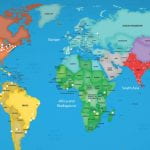One year ago, USF students were being brought back to the US from their Arrupe Immersions. This was hours before countries started closing their borders as a measure to prevent the COVID 19 global pandemic. What we thought at the moment as a temporary pause in activities became a year of sheltering in place and zoom meetings. Fast forward to today, this spring break is the first since 2000 that USF does not send students for an Arrupe Immersion abroad.
Historically, the Arrupe immersion programs attract an interesting group of people: students looking for their purpose in life; passionate resident ministers and faculty with experience in community engagement and discernment; international partners working with marginalized communities; and other committed members of the USF family helping us to pursue an education that serves people at the margins of society. This unique combination of people has allowed us to work on leadership programs, engage students with opportunities to pursue their questions that are awakened during the immersion experiences, and most importantly, to learn as an organization.
The pandemic forced us to re-envisioning the Arrupe Immersions programs, and be more explicit about the spaces, both physical and virtual, in which we engage with the world outside USF. In that way the Arrupe Initiatives is constantly thinking about the following challenges:
- The need for community and to be in solidarity. The current situation has limited our options to understand the world, and if we are not careful, there is a danger of intellectualizing issues and disconnecting them from concrete realities. The world is a complex network of meanings and feelings that is best comprehended through interactions. For the last three years, the Arrupe Observatory has been collaborating with the Truth and Reconciliation Commission in Colombia. We are one of the groups collecting testimonies of Colombians in exile that will shape the final report that is due in November of this year. During our meetings, we have guests from the commission, researchers, and volunteers sharing the space with USF graduate students to think together about how to best contribute to the peace process in Colombia.
- The politics of memory and forgetting. The communities that we visit in Peru, Colombia, DR, Mexico, and the US experience different forms of violence and marginalization. For many participants (both USF students and our immersion hosts*), visiting these communities during the Arrupe Immersion create spaces to articulate stories that are pushed to the margin. During this time of isolation, many feel that their stories are being forgotten. Our platform of Community Voices has allowed us to share the reflections from people from within USF, our friends and partners, and from the Jesuit universities to show that we care and we continue listening.
- The sensible rationality. The Arrupe immersions question the intellectual tendency of approaching social justice as topics instead of experiences of people with hopes and dreams. The pandemic has dispossessed us from being present with a person to focus on theoretical concerns, and intellectual rationality doesn’t always awaken our sensible rationality. Injustice could also be polarized as many are isolates with their privileges. Our leadership formation program, I-LEAD, highlights the importance of nurturing a sensible intelligence to be a good leader.
We expect that for 2022 Immersions will be back in action and we plan to continue offering students the opportunity to travel and engage with the Jesuit network. We also expect that some of our platforms will grow and provide us with new opportunities to engage with the world. This past year was hard for us and for many, but through deep reflection and continuous comradery, we are emerging stronger than ever, with a renewed mission to offer USF students international experiences to open their minds and hearts.
*What makes Arrupe Immersions special and different from other immersion programs is that we are invited into the community by hosts with who we have a long-standing relationship with. We are invested in these communities and stand in solidarity with them. We do not go into these spaces to offer “service” nor to “fix” a problem, we are invited to hear their stories and share a moment of empathy and understanding.




